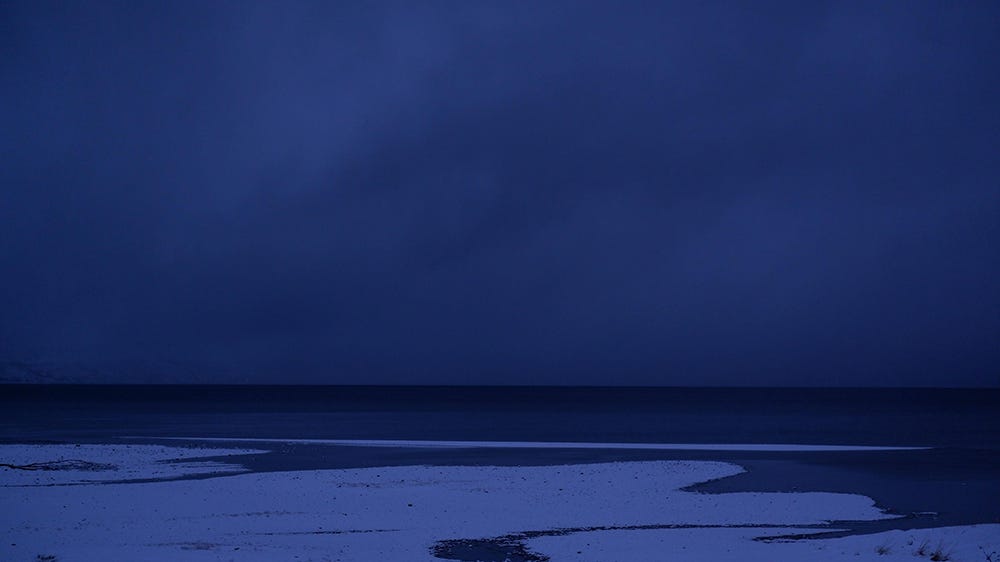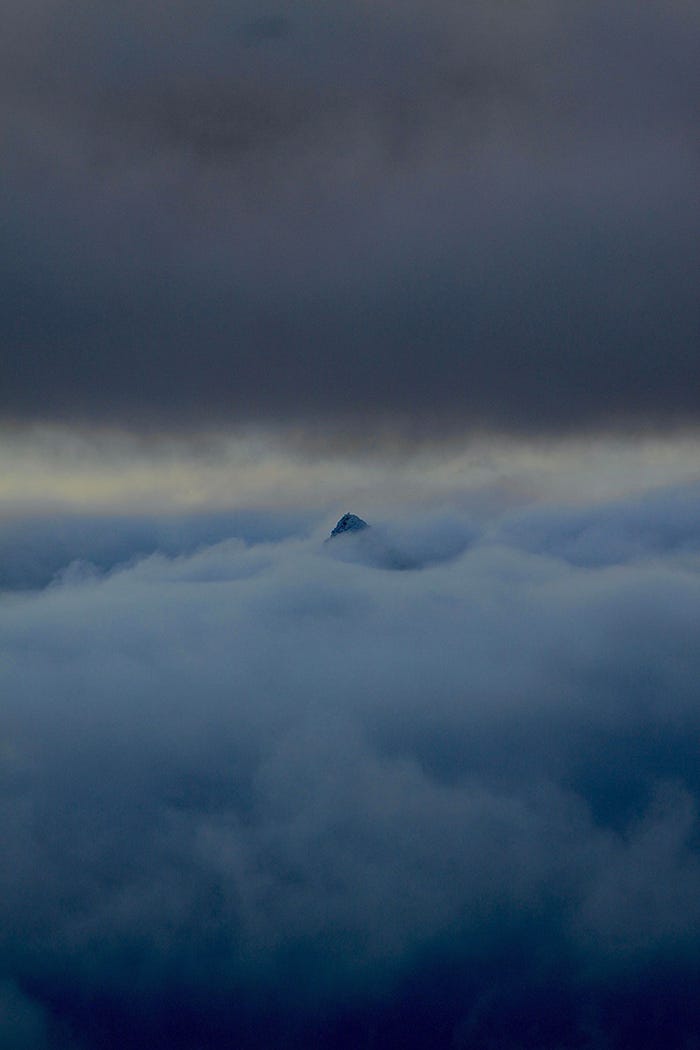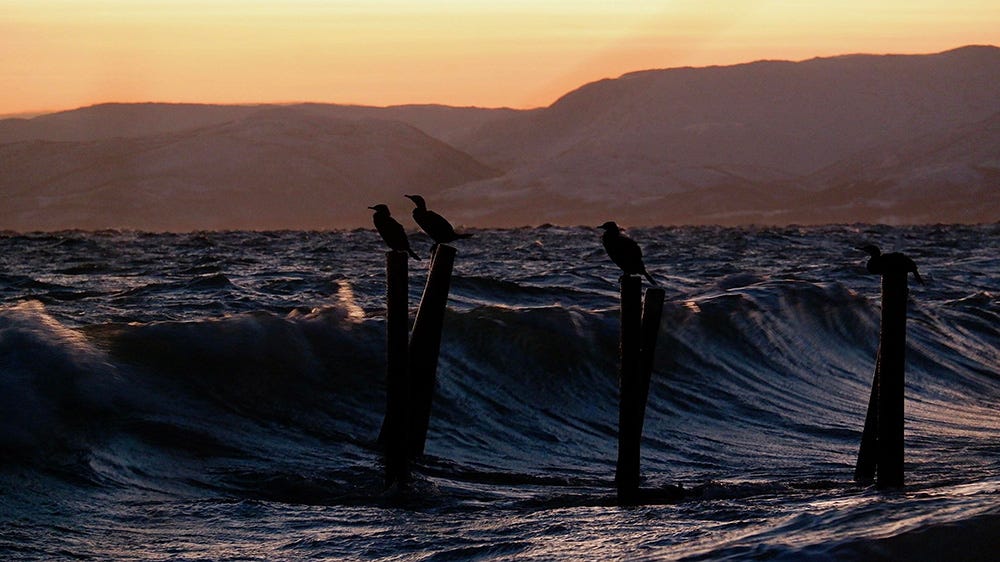February
"There is a sense that things outside—call them worlds— have been hidden from us and are now being revealed. The window panes hold more blue. The two peaks across the sea are no longer shadows."
In this country, February is a season of clouds and light. For a couple of months it has been dark, and some of us have not seen the full, round body of the sun since November. But this winter has not been as cold as last winter. Maybe it has not been as dark either, though I am less sure of the dark. There is snow, of course. The snow is nearly constant.
As is my routine, I wake early. The house is quiet, and I quietly set up the coffee machine. I pour water into the reservoir and add 2 healthy scoops of dark roasted coffee into the paper filter. I touch the brew button and wait to hear the sound of steam and water running through the machine. That sound of water and steam feels like a start, and soon the smell of hot coffee will come.
As a child, I listened to adults talk about the struggles of February. They talked about February being a long month, despite its fewer days. They talked about how despair is more prevalent and how they wished for Spring. How, they said, they were ready for Spring. February was a month to get through and, for some of the adults I knew, to survive. Although I never noticed the difference of February, I do recall wondering if February would become a month to get through when I became older, if it would become a month I needed to survive. I do not believe I am there yet, but I am starting to empathize with those adults who once worried so much.
Our landscape here is changing. The world is moving out of the darkness and into light. I do not know anyone who is upset about this. There must be someone. I pour my first cup of coffee and stand with the cup in my hands beside the kitchen window, leaning, as I do, with my shoulder braced against the casing. I look outside. I sip the coffee. There is a sense that things outside—call them worlds— have been hidden from us and are now being revealed. The window panes hold more blue. The two peaks across the sea are no longer shadows. The sea and the sky have renewed their vows, and the clouds are their witnesses. We know this because we can see sunlight touching the water again. There is a pull from what is close and faraway. Our eyes rise toward its warmth. Our bodies angle toward its blaze. And this same sunlight crosses the sea, glazing the waves and leading our vision to other islands and the mainland. We need only to stop to see them. But this is not easy. As much as we may desire to be still, this practice of stopping, of seeing, of seeking beauty is difficult. We can anticipate too much. We can ask for too much. We can shatter ourselves with our ordinary pettiness. We know this about ourselves, too, and so we try to be still. Why do we stare at the sea? Because there is a hope, perhaps even a faith that the good in us will be extended by the good of what is out there.
It doesn’t take much sunlight to gather our attention. I swallow another sip of coffee and glance in the cup afterwards out of habit. We are already starting to come out of our homes. This is what happens. The sun returns, and we return outside. We go for walks. I want to believe we meet in the places we love. By places, I do not mean specific ground, like between Tron-Gunnar’s naust and Gunnar’s house, but I mean the here of where we are. And when I met Gunnar the other day, we talked about lutefisk. I told him that Edmund served the best lutefisk. Gunnar nodded and said that it must be served with bacon. We also talked about diabetes. Gunnar said he was diagnosed with diabetes as a young boy in the early 1960’s. He said that some of the women in the village told his mother, “You know, they do not live long.” His mother said, “My Gunnar will live long.” Gunnar smiled as he told me this story. He has the sort of smile that rounds his entire face. He showed me his insulin pump. He said, “My mother is also alive.” He smiled again, and we planned to take a coffee soon, as we do here. Then we nodded and waved hadet and continue on our separate walks. This is meeting here.
One cup of coffee. That is all I have brewed. The sun is not over the mountains yet but I can see well enough outside. Snow is falling, and the light is more grey now than blue. Snow and snow days will last for a while. They could last until May, but I hope not. I rinse my cup and set it on the drying cloth. There is a slight clink when I do, followed by a hard silence, as though the air had been cleared. And I listen.
If you prefer to make a one-time donation, you can contribute any amount to Juke using these Venmo and Paypal links.
Damon Falke is the author of, among other works, The Scent of a Thousand Rains, Now at the Uncertain Hour, By Way of Passing, and Koppmoll (film). He lives in northern Norway.






perfection. so very lovely, damon. my favorite line among the many - "the sea and the sky have renewed their vows". thank you
Yes.
The first subtle signs of the change
Very well done.
Thank You.